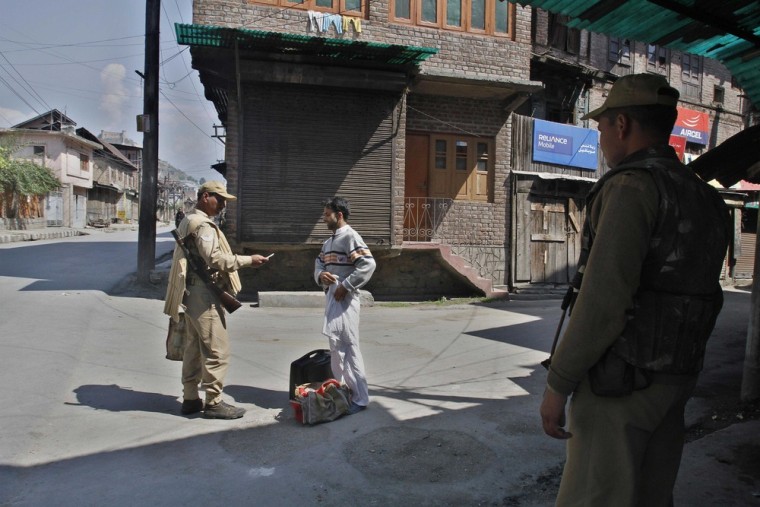Kashmiri separatist leaders on Sunday rejected India's offer to release hundreds of young detainees and review the massive deployment of security forces in the Himalayan territory to defuse deadly civil unrest.
At least 107 people, mostly teenage boys and young men in their 20s, have died in a crackdown by security forces on often-violent demonstrations since June, with every death stoking public anger and more protests.
Authorities relaxed a rigid curfew for several hours on Sunday in Srinagar, the main city in the region, and seven main towns following a pause in the unrest. Thousands of people crowded markets to stock up on food and other essentials.
The mountainous region is divided between India and Pakistan and claimed by both. Protesters reject Indian rule and want independence or a merger with predominantly Muslim Pakistan.
On Saturday India said it would consider scaling back security in the disputed Kashmir region, aiming to calm months of protests against Indian rule. It also offered to urge authorities to release detainees, review deployment of security forces and to hold talks with all stakeholders in the part of Kashmir it holds.
New Delhi's proposal follows a visit to Kashmir by about 40 lawmakers from major Indian political parties to seek ways to end the turmoil. India has also offered compensation of 500,000 rupees ($10,800) to each of the families of those killed since June 11.
The eight-point conciliatory package also included compensation for the families of dead protesters and a promise to review the scope for limiting a much-hated law that gives the military sweeping powers to search, arrest or shoot.
"We will request the state government to immediately convene a meeting of the (security) Unified Command and to review the deployment of security forces in Kashmir valley, especially Srinagar," Chidambaram told reporters after a meeting of the Indian cabinet's committee on security.
The separatists, however, rejected the Indian government's proposals.
India's only Muslim-majority state, which is also claimed by Pakistan, has been in a siege-like state of strikes, protests and curfew for months. Most shops, offices and schools are shut, and roads deserted.
Critics have until now accused Prime Minister Manmohan Singh of failing to take the largest pro-independence protests in two decades seriously, and the plan marked a dramatic shift in the government's position.
Opening gambit
"This could be an opening gambit for building confidence because measures like releasing people and reducing security foot prints will resonate with the common people," said Siddharth Varadarajan, strategic affairs editor of the newspaper The Hindu.
But Kashmiri separatist hardliners rejected Chidambaram's offers as "eyewash" and declared a 10-day protest.
"None of our demands has been met, so we will continue the protests," said Syed Ali Shah Geelani, who has emerged as the leading face of the present cycle of street violence.
More than half a million security personnel are deployed in Kashmir, most of which has for years been declared "disturbed" — a precondition for application of the Armed Forces Special Powers Act.
Kashmiri separatists accuse the army of large-scale human rights abuses, and want the law withdrawn.
Chidambaram said the state would look at the option of limiting the areas of Kashmir where the act operates.
He also said the state government would consider scaling down the number of bunkers and checkpoints in Srinagar, Kashmir's summer capital, and other towns.
"We think these steps should address the concerns of different sections of the people in Jammu and Kashmir, including the protesters," Chidambaram said.
Analysts said the move suggested that the federal government might be willing to shift more responsibility for handling the revolt to the state government in Kashmir and its chief minister, Omar Abdullah.
Government call
"It will be up to the state government to take a call on removing the disturbed areas act from some places and getting the army and paramilitary to play ball," said Uday Bhaskar, director of the National Maritime Foundation think tank in New Delhi.
Geelani, the 80-year-old separatist leader, has laid down five conditions for a dialogue with New Delhi. They include India accepting Kashmir as an international dispute, revoking the Special Powers Act and demilitarizing the region.
Tens of thousands of people have been killed in Kashmir since an armed revolt against New Delhi's rule first erupted in 1989. India says Pakistan fans the rebellion.
While a previous generation of Kashmiris often embraced militant groups, a new generation has used street protests, Facebook and mobile phones to spread revolt. Most of those killed by police bullets since June have been protesters throwing stones.
Kashmir is divided between India and Pakistan, both of which claim the region in full. They have fought two of their three wars over it. Kashmiri separatists in India want to carve out an independent homeland or merge with predominantly Muslim Pakistan.
